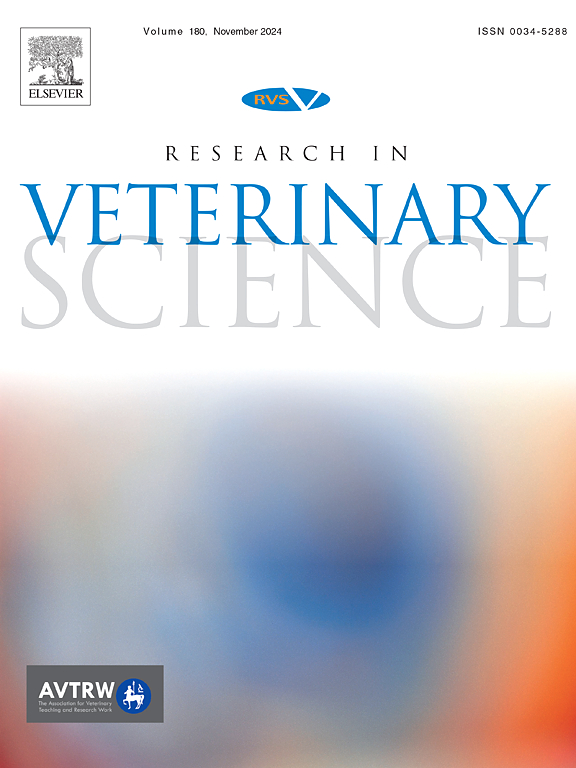Genetic characterization of infectious bursal disease virus strains with distinct VP2 amino acid profiles emerging in Pakistan
IF 2.2
3区 农林科学
Q1 VETERINARY SCIENCES
引用次数: 0
Abstract
Infectious bursal disease (IBDV) poses a significant threat to the global poultry industry and causes major economic losses. This study presents the genetic profile of IBDV strains emerging in Pakistan, focusing on the VP2 amino acid profile. The effects of these changes on disease transmission, vaccine effectiveness, and overall chicken health are concerning. A meticulous analysis was carried out by isolating and clustering IBDV strains collected from Faisalabad district of Pakistan. The genetics of these viruses were evaluated by analyzing the VP2 gene, the main component of the virus. Importantly, our results reveal the existence of IBDV strains with unprecedented VP2 amino acid profiles, indicating genetic changes that may affect virulence and immunity. This study highlighted the changing IBDV landscape in Pakistan and underscores the importance of continued research and surveillance efforts. Understanding the genetic structure of these emerging diseases is essential for developing effective control strategies, including vaccine development and control. This also emphasized the need for international cooperation to reduce the spread of the new IBDV strains, which could significantly impact the poultry industry outside Pakistan.
巴基斯坦出现的具有不同VP2氨基酸谱的传染性法氏囊病病毒株的遗传特征
传染性法氏囊病(IBDV)对全球家禽业构成重大威胁,并造成重大经济损失。本研究介绍了在巴基斯坦出现的IBDV菌株的遗传谱,重点是VP2氨基酸谱。这些变化对疾病传播、疫苗有效性和整体鸡健康的影响令人担忧。通过分离和聚类收集自巴基斯坦费萨拉巴德地区的IBDV菌株,进行了细致的分析。通过分析病毒的主要成分VP2基因来评价这些病毒的遗传学。重要的是,我们的研究结果揭示了IBDV菌株存在前所未有的VP2氨基酸谱,表明遗传变化可能影响毒力和免疫。这项研究强调了巴基斯坦IBDV格局的变化,并强调了继续开展研究和监测工作的重要性。了解这些新发疾病的遗传结构对于制定有效的控制战略,包括疫苗开发和控制至关重要。这也强调需要进行国际合作,以减少新的IBDV毒株的传播,这可能对巴基斯坦以外的家禽业产生重大影响。
本文章由计算机程序翻译,如有差异,请以英文原文为准。
求助全文
约1分钟内获得全文
求助全文
来源期刊

Research in veterinary science
农林科学-兽医学
CiteScore
4.40
自引率
4.20%
发文量
312
审稿时长
75 days
期刊介绍:
Research in Veterinary Science is an International multi-disciplinary journal publishing original articles, reviews and short communications of a high scientific and ethical standard in all aspects of veterinary and biomedical research.
The primary aim of the journal is to inform veterinary and biomedical scientists of significant advances in veterinary and related research through prompt publication and dissemination. Secondly, the journal aims to provide a general multi-disciplinary forum for discussion and debate of news and issues concerning veterinary science. Thirdly, to promote the dissemination of knowledge to a broader range of professions, globally.
High quality papers on all species of animals are considered, particularly those considered to be of high scientific importance and originality, and with interdisciplinary interest. The journal encourages papers providing results that have clear implications for understanding disease pathogenesis and for the development of control measures or treatments, as well as those dealing with a comparative biomedical approach, which represents a substantial improvement to animal and human health.
Studies without a robust scientific hypothesis or that are preliminary, or of weak originality, as well as negative results, are not appropriate for the journal. Furthermore, observational approaches, case studies or field reports lacking an advancement in general knowledge do not fall within the scope of the journal.
 求助内容:
求助内容: 应助结果提醒方式:
应助结果提醒方式:


